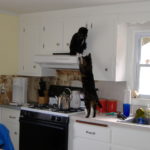
Urinary Tract Disease in Cats-Why Won’t My Cat Use the Litter Box
Urinary tract disease in cats can cause inappropriate eliminations or going outside of the litter box. Many cat parents assume that this problem is caused because of spite thinking that their cat is trying to get back at them for something. Luckily, cats don’t share this very human emotion of spite and revenge. Going outside of the litter box is always caused by some very real medical or psychological problem.
The first avenue to explore is ruling out a medical condition causing discomfort to the cat. I laugh with my clients that when there cat is elimination outside of their litter box that is their way of saying TAKE ME TO THE VETERINARIAN! In fact, one client described her cat eliminating outside of the litter box for several weeks before finally climbing up on the kitchen counter and urinating on her sandwich! I think that is a clear cry for help.
Young cats usually don’t get urinary tract infections but can suffer from concentrated urine that produces stones or crystals that can wreak havoc inside their bladders. These stones or crystals have some genetic predisposition but can be prevented by feeding an appropriate diet.
The Cat Clinic of Plymouth always recommends a canned food diet that can reduce the incidence of formation of these issues by allowing the urine to have the appropriate pH and dilution. Studies have shown that cats concentrate their urine very well allowing the formation of these issues in the urine. Studies further support that even when a client believes their cat drinks enough water but eats mostly dry food their cat’s urine is many times more concentrated than a cat that eats a mostly canned food diet.
Male cats that eat a mostly dry food diet are more prone to urinary blocking. A blockage in the urinary tract is life threatening. If your cat is straining in the litter box, this is an emergency.
Another predisposing factor for urinary tract issues in any aged cat is stress. Multiple cat households, indoor life, lack of environmental stimulation, changes in the household can cause physiological stress in a cat that result in increased circulating cortisol that attacks the bladder wall. This makes them feel as though they have a urinary tract infection. This feeling can come and go throughout the day or week making it difficult to track due to inconsistency. See our blog on litter box care and environmental stimulation for more information.
Older cats can also suffer from urinary tract infections caused by underlying medical conditions such as obesity, kidney disease, diabetes and hyperthyroidism to name a few. Many of these conditions are easily treatable. So again make sure your cat sees your veterinarian for routine checkups especially as they age. If you have trouble getting your cat in the carrier see our handy guide to Getting Your Cat in the Carrier.



 Losing a Pet
Losing a Pet



